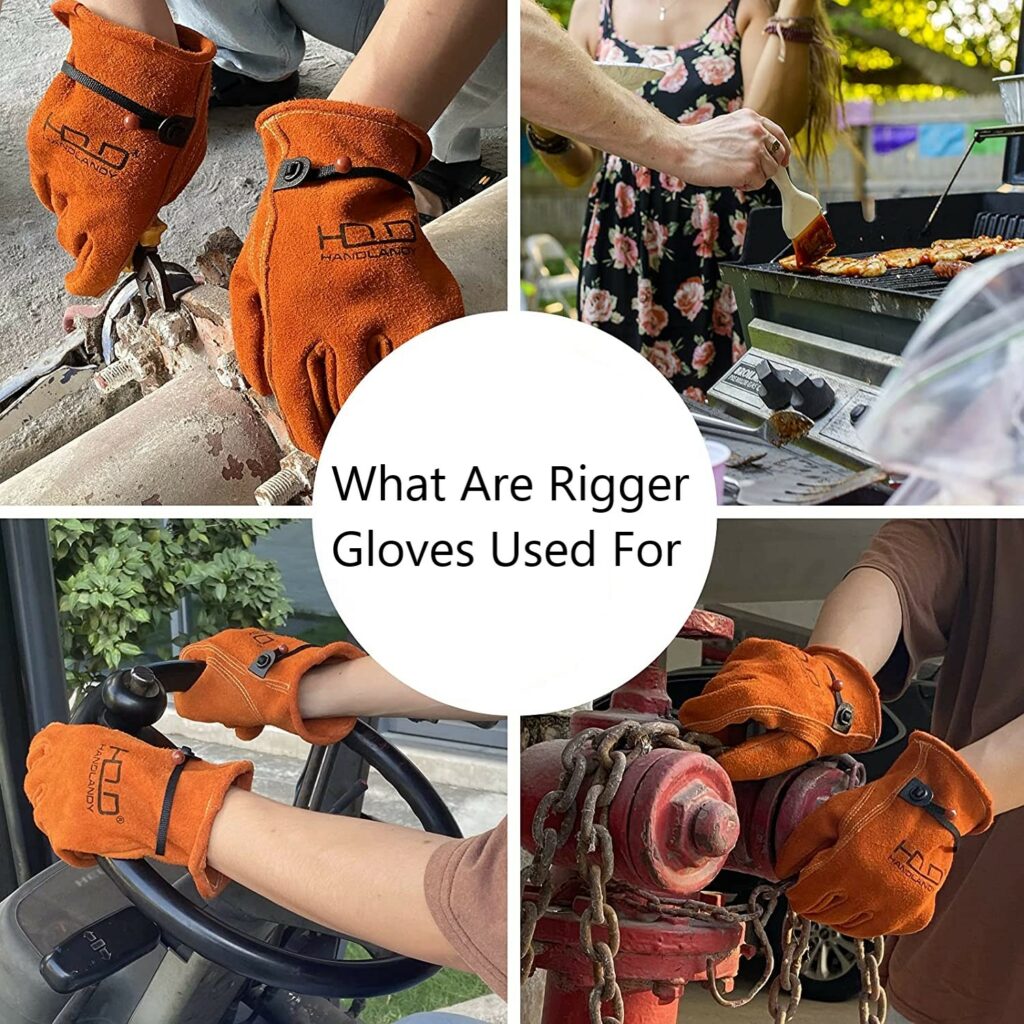Rigger gloves are also known as reinforced gloves that are made with a blend of leather and cotton. It’s no rocket science that these gloves are used for rigging and rope pulling, but is that all?
Since rigger gloves are heavy-duty gloves that stand the test of time, they’re naturally used in more industries rather than just rigging.
Rigger gloves are of many types. Depending upon the type and the special features incorporated in them, rigger gloves can be used for construction work, chopping wood, lifting heavy furniture, gardening, mechanics, warehousing, and much more.

The tensile strength of rigger gloves makes them suitable for more industries than you cannot even think of. The primary reason that rigger gloves are used for so many purposes is that they resist abrasion, last longer, and are easier to wash.
More importantly, they will also protect your hands from hazards such as chemicals, fire, and toxins. Hence, rigger gloves can also be used for high-risk jobs that involve the risk of blistering and burning.
There’s a wide variety of rigger gloves that make them diverse and fit the needs of different industries. That’s what we have covered in this guide.
Expect to learn all the basics about rigger gloves: what are they used for and why, what are the types, what are the best fabrics for rigger gloves, some of the best options, features that all good rigger gloves have, and much more!
What Are Rigger Gloves Used For: Are They Multi-purpose in the True Sense?
Rigger gloves are absolute work gloves that offer safety from multiple work hazards. They’re reinforced and the knuckles and palms are well-protected and padded since they sustain maximum injuries when an accident happens.
The industries where rigger gloves are used because of the brilliant overall protection they offer have been compiled in the pointers below. Have a look!
-
-
- Rigging, oiling, and mining.
- Agriculture and gardening.
- Construction of roads, buildings, railways lines, and everything that puts the knuckles at the risk of breaking.
- Chemical handling.
- Welding.
- Warehousing. (Best Gloves for Warehouse)
- Forestry that also includes chopping timber.
- Transporting and lifting heavy furniture and appliances.
- Mechanics and repair of heavy-duty machinery.
-
Naturally, something that’s ideal for so many industries (almost all high-risk jobs) is multipurpose in the true sense. What’s even better is that one pair will last for many years. So, Rigger gloves are money well spent and one-time investments.
What Fabrics Are Used to Make Rigger Gloves and Why?
Leather and cotton are the two fabrics that are used to make Rigger gloves. There are many reasons that these two premium-quality fabrics are used and preferred over so many other fabrics. Let’s find out those reasons.
1.) Premium-quality leather resists heat, flames, and fire.
2.) Cotton has this excellent property of breathability.
3.) Padded leather and cotton resist impact, chemicals, and blistering so much better than any other material (real or synthetic) you can think of.
4.) Neither of the two (leather and cotton) will ever cause allergies. Even if your skin is sensitive, rigger gloves are ideal.
5.) Cotton and leather combined offer excellent grip.
Some gloves are made of faux leather and some others are made of real leather. The type you buy should be able to offer protection specific to the industry you work in.
It’s common that some rigger gloves have fur linings and some others feature neoprene padding. These fabrics are added for protection and safety.
The Many Types of Rigger Gloves
Different industries have different hazards and different requirements. For instance, rigger gloves designed for welding might not be ideal for warehousing since there is a considerable temperature difference.
And this is just one example of the many differences. Keeping such important differences in mind, Rigger gloves are of many kinds.
We have covered the 5 major types that fit the socket of needs of different industries in the upcoming sections. Dive in for the details.
1.) Insulated Rigger Gloves for Cold Conditions
Insulation is an utmost necessity when working in cold climatic conditions. Many states in the US witness excessive snow and that’s where thermal rigger gloves come to the rescue. They are fabricated with a fur lining that keeps the chill out.
2.) Heat-resistant Rigger Gloves for Soaring Hot Temperature
Working as a welder or a mechanic brings forth the dangers of working close to fire and flames. Similarly, there are many industries where heat is an obvious hazard. That’s where heat-resistant rigger gloves are used.
3.) Reflective/Fluorescent High-visibility Gloves for Safety During the Night
Working as a construction worker at night or when the visibility is low can be life-threatening. High-visibility rigger gloves incorporated with fluorescent or reflective stripes are ideal in such situations.
4.) Heavy-Duty Rigger Gloves for Impact Resistance
Working at places where the threat of injuring your hands due to heavy impacts calls for the need for heavy-duty gloves that offer a greater bit of protection around the knuckles, fingers, thumb.
5.) Double Palm Rigger Gloves for Jobs that Require a Tough Grip
Sometimes, the impact isn’t the real danger, friction is. Pulling a rope for instance can peel the skin of your palms and cause painful blisters.
Similar problems are faced by gardeners and farmers pulling out weeds. Forestry sees similar hazards. These are kinds of industries that require double palm rigger gloves.
These gloves have extra padding under the palms so that your skin does not peel even if the pressure is high and you really require a very strong grip to get the work done without getting injured.
Features You Just Cannot Overlook When Buying Rigger Gloves
Now that you have the most vital pieces of information about rigger gloves, you might be tempted to buy them – hold that thought just yet! Not all rigger gloves that you find on display offer the protection that’s promised.
Only when the rigger gloves you’re buying have all the features listed below they will offer real protection. Have a look and then take a call!
1.) Only limited brands will offer rigger gloves of the right size. Besides, it’s very, very important that you buy those gloves that have a loop and a band closing at the wrist. This is the only way that the gloves won’t come off while you’re working and will offer a perfect fitting.
2.) No matter whether the gloves are insulated or heat-resistant, if they’re not moisture-wicking and breathable, they are as good as nothing.
Only premium-quality leather, fur, and cotton have the ability to absorb moisture and sweat so that your fingers won’t slip inside the gloves while you’re working.
3.) If rigger gloves don’t offer a sturdy grip, they won’t do the job right. Be very careful about the seam and the kind of padding provided at the knuckles and palms.
How to Clean Rigger Gloves: Why’s it So Important?
It might sound a little far stretched, but cleaning rigger gloves is doubly important than cleaning your normal gloves.
Why, you ask us? Well, rigger gloves are used for tough jobs that put them through all sorts of unhygienic conditions.
On top of everything, if the rigger gloves you’ve purchased are pure leather, in the lapse of proper cleaning, the leather will attract all sorts of microbes since it’s animal skin.
Here’s how you can REALLY clean your rigger gloves so that they can last for years, even a decade, to come.
1.) Don’t start with water directly. First, take a bristled brush and scrub the gloves to remove as much grime, dust, and soot as possible.
2.) A soapy mixture of cold water comes next. You can use your normal washing powder. Gently knead the gloves in the soapy solution.
3.) Another great option to ensure that every nook and corner of the gloves are cleaned is to wear them and then rub them against each other.
4.) After about 15 minutes of cleaning in the soapy water, it’s time to put the gloves inside fresh cold water and remove all the soap. Wash until they’re entirely soap-free.
5.) Let them rest in natural air until they’re completely dry.
And voila, your rigger gloves will be just as good as brand new.
Best Rigger Gloves You Can Count On
1.) Deerskin Unisex Rigger Gloves
- Deerskin Leather Work Gloves - 100% Genuine deerskin leather, nature tanning, comfortable and durable.
- Forge Welding Gloves - Fire Resistance heavy duty deerskin and fireproof aramid fiber thread, meet NFPA2112, EN11612, EN11611. Perfect protection for your hands when welding or forging or other high temperature work.
- Heavy Duty Work Gloves - Details: Soft fitting and thick deerskin material, excellent stitching process, ergonomic curved design, make heavy duty work gloves more comfortable.
Prices pulled from the Amazon Product Advertising API on:
Product prices and availability are accurate as of the date/time indicated and are subject to change. Any price and availability information displayed on [relevant Amazon Site(s), as applicable] at the time of purchase will apply to the purchase of this product.
These are fantastic gardening rigger gloves made of deerskin. They’re equally sturdy and tough to be used for welding, landscaping, and chopping timber. Some of the fantastic features that make these rigger gloves perfect options for so many industries are as follows.
1.) Deerskin is flame-resistant and fire-resistant. Hence, these gloves are safe for welding.
2.) The surface is super tough and abrasion-resistant too. Since these gloves can easily resist punctures and cuts, they are perfect for gardening and wood chopping.
3.) An adjustable wrist band makes them perfect since they won’t slip off your hands while you’re working.
4.) They’re one of the very rare options that come in different sizes ranging from small to medium, large, and extra-large. So, the chances that you’ll find something extremely well-fitted are very, very high.
Check Price and Reviews on Amazon2.) Vgo Waterproof Rigger Gloves for Winters
- Premium genuine goat leather both back and palm provides comfort and dexterity for all-day wear; Dual-layer palm reinforcement padding with neoprene provides excellent durability and absorbs vibration; Touchscreen compatible design on the thumb and index/middle fingertips for smartphone control
- Premium genuine goat leather both back and palm provides comfort and dexterity for all day wear; Dual-layer palm reinforcement padding with neoprene provides excellent durability and absorbs vibration; Touchscreen compatible design on thumb and index/middle fingertips for smart phone control
Prices pulled from the Amazon Product Advertising API on:
Product prices and availability are accurate as of the date/time indicated and are subject to change. Any price and availability information displayed on [relevant Amazon Site(s), as applicable] at the time of purchase will apply to the purchase of this product.
These 3M Thinsulate super-insulated rigger gloves offer warmth and comfort even when the temperature drops below -4℉. On top of everything else, they’re waterproof, not water-resistant.
They have a very tough build that makes them abrasion-resistant too. Some of the most exclusive features are as follows.
1.) They’re made of real goat leather that offers amazing resistance to flame.
2.) They’re double palm rigger gloves with neoprene padding at the palms for added comfort and excellent grip.
3.) The knuckles are reinforced with thermal plastic rubber that offers protection from cold.
These rigger gloves can be used for gardening, forestry, construction work, welding, warehousing, as well as rigging.
Check Price and Reviews on AmazonConcluding Thoughts:
Rigger gloves are of various types. Due to this diversity, rigger gloves can be used for many industries that include landscaping and gardening, farming and forestry, construction and warehousing, rigging, and welding, and mechanics.
You have to make sure that you’re buying premium-quality leather and cotton rigger gloves since these two fabrics are the best. They wick away moisture and are breathable at the same time.
As long as your choice of rigger gloves is right and suitable for the kind of work that you do, you cannot go wrong!










